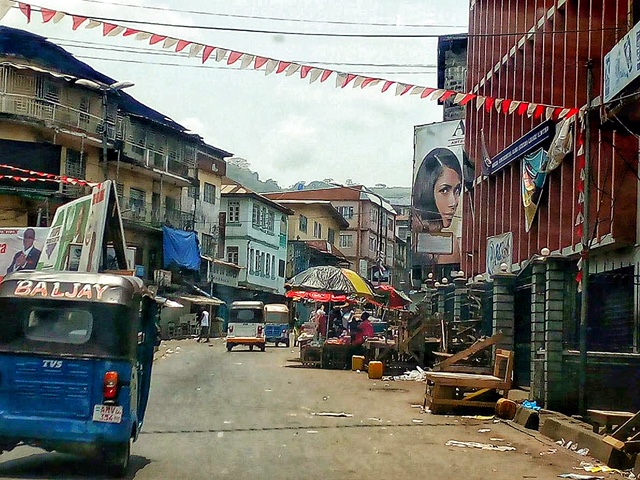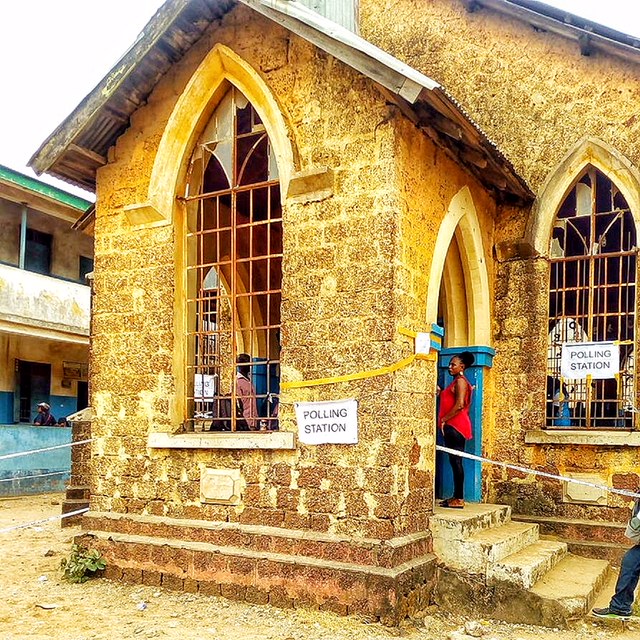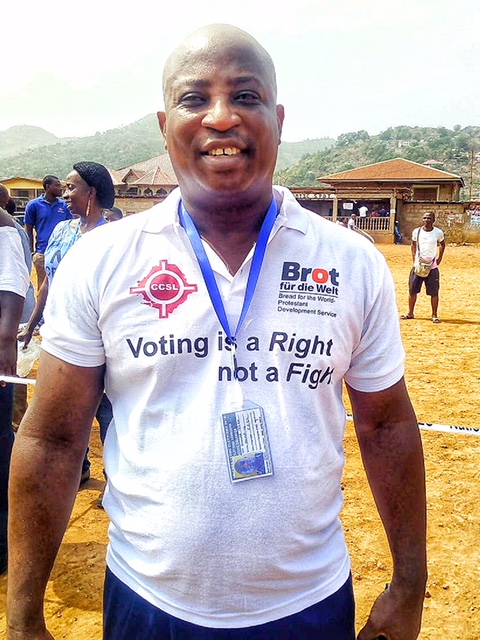On the 4th of April, I was sitting on the veranda of a restaurant in Lungi and watched mesmerized the police officer next to me who, in his full gear, consumed bitter wine sold in small plastic packets. As he was finishing one packet after another, he was visibly getting drunker with each sip. The scene provided the context – both in historic and sociological terms – for what had been the most important public issue for Sierra Leone for the past few weeks: the presidential elections.
With his drunkenness, the policeman’s voice grew louder. I could not miss it: he was boasting of his rebel past. He was armed. With this open and embodied reference to the RUF he reminded us all how the brutal memory of the civil war was still so near, constituting a permanently threatening background to national politics. Sierra Leone got liberated from a deadly civil war just 16 years ago, too short time for a nation to forget the trauma but sufficiently long for the new generation to forget about the healthy fear of violence. In fact, the spectrum of violence seemed so real that the maintenance of peace and order was the number one stake in this election. A lot of people whom I asked about their hopes responded me spontaneously: “I just pray for peace”.
As we were sitting on the terrace, we were all waiting for the final results. The first round of the election had taken place on the 7th of March. It ended up with the narrow victory of the opposition party, the SLPP. Its advantage was somewhat reduced but still maintained after a recount demanded by the defeated ruling party: SLLP scored 43,3% versus 42,7% for the APC. The APC contested the results. It made its suspicion clear already on the day of the election by a spectacular police raid commanded against an SLPP office. As many commented, it was unusual that a ruling party was afraid of election fraud. This fear could only be explained by APC’s shaky position, which was finally confirmed by its defeat. Immediately after the announcement of the results, newspapers started to publish unforgiving articles about the incompetence of NEC (the National Election Committee), about the secrete interference of Western powers interested in regime change and about suspicious activities around the SLPP headquarters. Street commentators were convinced that NEC was indeed biased, what is more, suffering from an internal rift between APC and SLPP supporters.
Out of the 16 competing parties, the SLPP and the APC together took almost all votes but neither of them achieved 55% necessary to form a government. A runoff was thus inevitable. That was a stalemate, signaling to everybody that it was better to remain cautious. This attitude probably explained why the public received the news with a remarkable calm when finally it came out on the 13th of March. Having witnessed previous elections in Sierra Leone I found the silence in Freetown that night surrealistic. There was almost no traffic on the otherwise always busy Kissy road, showing that peace was indeed on everybody’s minds. People preferred to remain safe at home lest something would happen. Nothing happened though. Around 10 o’ clock all the bars of the city center played the football match of the day and men sitting around commented the game instead of politics.

Empty street in downtown Freetown, photo by the author
The date of the runoff was fixed for the 27th of March. However, the week before an individual APC member filed a court case against the NEC on the basis of alleged malpractice. The next day the front page of a leading newspaper bore this not too elegant title: “Now the NEC boss is pissing in his trousers”. It was difficult to imagine how the electoral process could go on in these circumstances but officially the runoff was still tabled for the 27th. On Saturday the 24th the High Court issued an injunction stopping the NEC from proceeding with the vote until the hearing next Monday. Nobody knew what would happen; all the possible scenarios were evoked. The hearing took place on the 26th, just one day before the planned runoff. The court’s decision came as a surprise, as well as a relief: NEC finally got the green light to conduct the runoff. It announced later that day that the Election Day would be postponed until the 31st of the month.

Makeshift polling station
The 31st was a Saturday and once again Freetown became empty as by magic. People voted, and then hurried home. No serious incidents were reported. Calm reigned even in the polling centers. The next day both parties declared themselves the winner. Their supporters were celebrating in town, without clashes, however. As time went on, more and more signs indicated that most probably SLPP had won. Social media was busy diffusing news on estimations but the official announcement still had not come. It was suspected that NEC was withholding the results for fear of outburst of violence.
Finally, on the night of the day when I met the drunken policeman in Lungi, the results were released. The opposition party overcame with a slight advantage, Maada Bio wining 51,8% of all the ballots. Except for a few sporadic incidents which were quickly appeased, the country still kept the calm. After 3 days, the APC candidate, Dr. Samura Kamara accepted officially his defeat and offered his cooperation to the sworn in President. The two politicians were photographed hugging each other with a broad smile. Those who had prayed for peace had reasons to believe that their prayer was heard.
Peace, however important, was not the only stake of the election. The outcome was of course as important as the smooth execution. After the peace, the second stake was maintaining a political order with international legitimacy. The only way to obtain this recognition was by demonstrating the democratic nature of the vote. SLPP had been in opposition since 2007 when APC took over power and held it for two terms. APC was the party which – under the charismatic and authoritative Siaka Stevens – introduced the one-party system and maintained it for 17 years. There seemed to be a real danger that should the APC keep power for a third term, yet under a new president, the reminiscences of the one-party system could be revived. In an inverse situation, the eventual victory of the opposition party could be read as a clear indication that in Sierra Leone today elections are won by the rule of law and not by the force. In other words, this election, the first conducted in a truly independent way, without the full guardianship of the UN, which had withdrawn its peacekeeping mission in 2014, had the potential of confirming, or alternatively disproving the success of the post-war democratization process.
The balance was not unequivocal. Prior to the election, some doubt has been cast on the authenticity of the Sierra Leonean democracy. Koroma’s unilateral decision to nominate his successor without allowing his party to vote for the new flag bearer was compared by some to Siaka Steven’s dictatorial methods. It was not the first time that President Koroma decided about people in his entourage like a sovereign, circumventing available democratic procedures. In 2015 he sacked his Vice President, Sam Sumana under murky circumstances. Later on, the ECOWAS Court judged this measure illegal, right on time for the ex-Vice President to stand against the APC candidate.
The ruling party was visibly not in a rush to quit the power and many had been worried that it would go as far as sabotaging the elections. Since 2015 there have been speculations that the government would use the constitutional reform process to extend the presidential mandate from two to three terms. In 2015-2016 supporters of the President campaigned for “more time”, arguing that the Ebola outbreak in 2014 stopped Koroma from accomplishing his work. The President himself remained silent but provoked more rumors as he waited until the last moment to announce the time of the presidential elections, fixing it for a date which slightly exceeded his legal mandate.
At several occasions during the electoral process, it was feared that the ruling party would indeed hold on to power by any means. This fear took a very concrete shape when the High Court suspended the preparation of the runoff, at the request by an individual APC member. It was difficult to believe that the man acted on his own. Understandably, the independence of the court was also put in question. However, the court order, rejecting the case and authorizing NEC to proceed stopped all speculations. The capacity of an opposition party to force out a regime change in a peaceful way added to the overall impression that in spite of several apparent irregularities and whatever might have happened behind the scene, the elections in Sierra Leone were not only “fair and free”, but also “credible”, conform to democratic norms.
The third and equally important stake was “change”. Voters, on all sides, independently from their political color, were praying for change. As my keke driver put it: “We the youth we are fed up, there is nothing in this country, I do not even want to stay here, everybody wants to go. We want change.” Not that Koroma, the incumbent APC president was unpopular. His achievements – of keeping social peace in hard times and his spectacular infrastructural projects – were usually recognized. “Di Pa dae work” (The father is working) was almost a proverb, a sentence people would usually pronounce in a bemused, half serious, half joking way, any time they came across with a route in construction (and there were a lot). It is true that lately I started to hear a transformed version: “the Chinese are working” which added more irony to the original sentence. But the new roads notwithstanding people were obviously tired, tired of their bad health system, of the dysfunctional education, the lack of employment and possibilities, the permanent poverty that strikes a majority of the population.

Voting is a right, not a fight.
People desperately wanted change. The debate revolved around this question: would Julius Maada Bio, the favorite opposition leader, who during the war for a short time was a military Head of State (and for this reason his name was linked to the past), or Dr. Samura Kamara, a diplomat with clean hands but with little political experience, hand-picked by the ruling president (and for this reason with doubtful autonomy) should be most apt to bring the so much desired change? Slightly more people opted for the first choice, but it was not uncommon that vote-citizens admitted that they saw no real choice. “We have two useless candidates” – was one of the most outspoken opinions that I heard. Will the New President still be a guarantee for the change?
Nothing is less certain. Reading the manifesto of the SLPP and that of the APC one sees little difference. Both are full of good intentions and promises without a clear blueprint for the implementation. Hearing the presidential declarations it is not clear how President Maada Bio will start working on the promised changes. The international political and economic climate will continue to limit the margins of maneuver for Sierra Leone. The country is heavily indebted and the only industry it can rely on to boost its GDP is mining, a promising sector that for more than half a century has failed to bring prosperity to ordinary Sierra Leoneans. In early 2018 the IMF refused to unleash the due installment of the aid promised to Sierra Leone on the basis that it had not achieved conclusive results in public spending cuts. However, public spending cuts have already ruined health and education, two sectors essential for any country’s human development. If it wants to please both the IMF and the citizens, the new government will find itself between a rock and a hard place. Chinese money is pouring into the country and Chinese money, as opposed to the IMF’s, does not come with conditionalities. At least with open ones. But before Sierra Leoneans could wake up, they may see much of their national assets mortgaged to Chinese investors. Time is running out.
The new government will face a constituency which is less and less ready to wait for improvements. And now citizens just had a taste of the feeling that they can influence national politics. Unless the government is able to start to truly alleviate poverty, create jobs, help raise a Sierra Leonean middle class, consolidate the health and educational system, and for all these purposes curb state – and non-state! – corruption, the new government might have more difficulty to pacify its constituency than the previous one had. Sierra Leone, from its political elite down to the bottom, played the game of democracy and now it is waiting for a well-deserved reward. Should it feel betrayed, both peace and democracy could be easily swept away by the sparks of resentment that until now have been kept in control by hope for change.
Dr. Diana Szántó is a cultural anthropologist and social activist. She founded Artemisszio Foundation, an organization actively promoting engaged anthropology in Hungary, which she directed for 12 years. Her research interest is in intercultural relations, international development, urbanity, civil society, migration, medical anthropology and disability. Her doctoral thesis investigated the post-war transformations in Sierra Leone from the point of view of polio-disabled communities. Currently, she teaches medical Anthropology at School for International Training (USA). Her book, “Politicising Polio in Sierra Leone” will be published by Palgrave Macmillan next year.
Leave a Reply